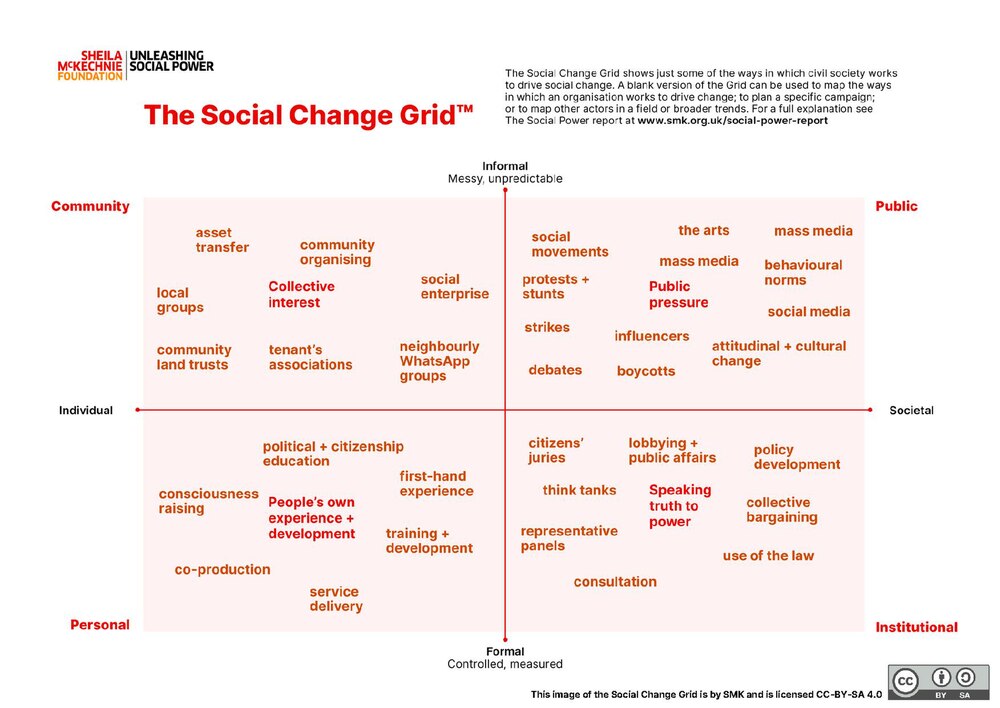Changemakers' Toolkit/Introduction to changemaking/The Social Change Grid
Introducing the tool
[edit]A key tool we can use to understand how change happens is the Sheila McKechnie Foundation's Social Change Grid. SMK developed this tool for a UK context, but the axes of formality and individual/societal can be applied to other contexts.
The grid allows us to visualise the different ways that social change can happen. This helps us to structure our plans, spot opportunities, identify gaps and build connections.

The Social Change Grid is split into four sections or quadrants. Each one represents a different space where power is held and campaigning activity can take place.
- The top left deals with community power. It's where individuals come together as a community with a shared interest, either in a particular place or online. This is also known as the grassroots. It includes community groups or networks, whether formal or informal. Social enterprises, community-run GLAMs, and wiki editing groups could also fit here. This is covered by collective interest.
- The bottom left deals with people's experience and development. It considers how a person’s first-hand experience can inform social change efforts and how a person can build their knowledge, skills and confidence. This is covered by public pressure.
- The top right quadrant is where public debate happens and opinions are formed. It is the place of culture and social norms, of mass actions like social movements, activism, public protest, boycotts and stunts. The media is important in this sector, including the news, social media, advertising, and popular culture. This is covered by people's own experience and development.
- The bottom right houses those who hold formal powers – like the ability to enforce the law or regulate a sector – or who have significant resource and influence and so can command change. It includes governments, international institutions like the UN or EU, the legal system, businesses, and big civil society organisations, like not-for-profit organisations. These entities generally hold a lot of power and resources. This is covered by speaking truth to power.
The location of activities within quadrants is important. The closer an activity is to the bottom of the grid, the more formal and predictable it is. And the closer to the right of the grid that an activity is, the greater the number of people involved.
Social change usually includes a wide range of activities. To be effective, your approach will need to include some activity from each of the four quadrants. If you are not best placed to deliver an activity, consider who else you could partner with.
If we now populate the Social Change Grid with groups and activities, it might look like this:

Case study
[edit]The #SheSaid program uses WikiQuote as a platform to share the voices of women at a global scale. Run by the WikiLovesWomen team, who are mostly based in African countries, it has tackled gender bias online through annual campaigns since 2020. To do this knowledge activists are trained on WikiQuote.
The campaigns partner with allied organisations to expand the network of contributors, such as Zimbabwe Library Association in 2021, or women journalists to expand content in Hausa in 2024. They produce bookmarks and postcards to inspire personal connections for contributors. The campaigns usually run October to December annually. In this period there are many international days of action which can leverage interest and support, for example International Day for the Abolition of Slavery.

As a result of these campaigns, the presence of women’s voices online is expanded and awareness is raised on gender inequity online. From 2020-22 there were 7721 new WikiQuote articles created in 11 languages, changing the nature of content on the internet.
Sources
[edit]- Zhakata, Ivan (28 September 2018). "'Embrace internet for development'". The Herald.
- Oury, Antoine (22 February 2021). "#SheSaid : rendre compte de la parole des femmes, sur WikiQuote". ActuaLitté (in French).
- "Foundation trains 11 women journalists on Hausa wiki-quote in Kaduna". Peoples Gazette. 14 January 2024.
- "#SheSaid: Honoring the Influence of Women and Their Impactful Quotes". WikiLovesWomen. 26 October 2023.
Homework exercise
[edit]Climate change presents a challenge to adapt: moving towards less polluting fuels and sustainable practices. Efforts to tackle climate change need to be cross-societal.
Using the Social Change Grid, think about different activities that could deliver change in the efforts to tackle the climate crisis.
Start with the 'Community' quadrant. Record any examples of changemaking activity that you can think of, then move to another quadrant.
